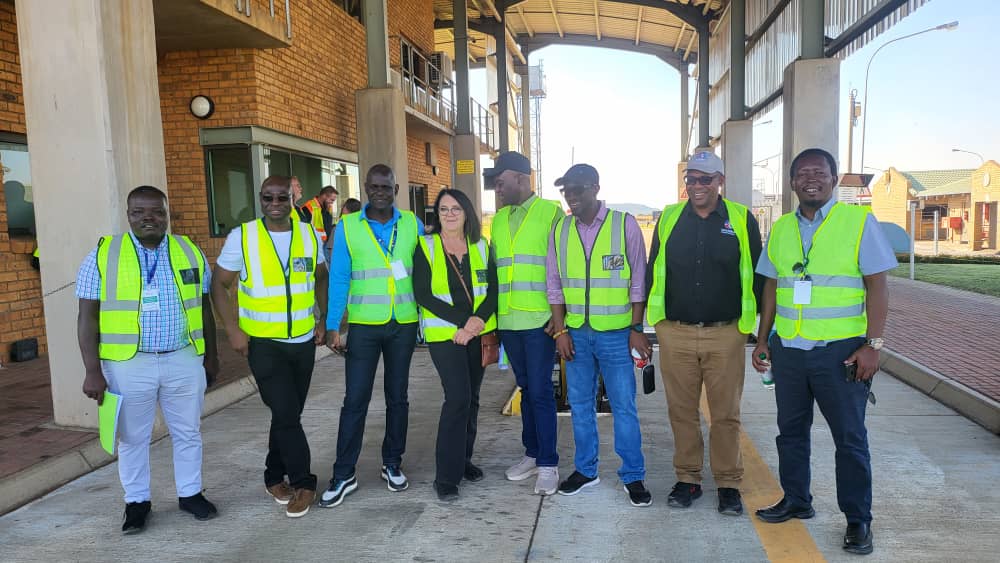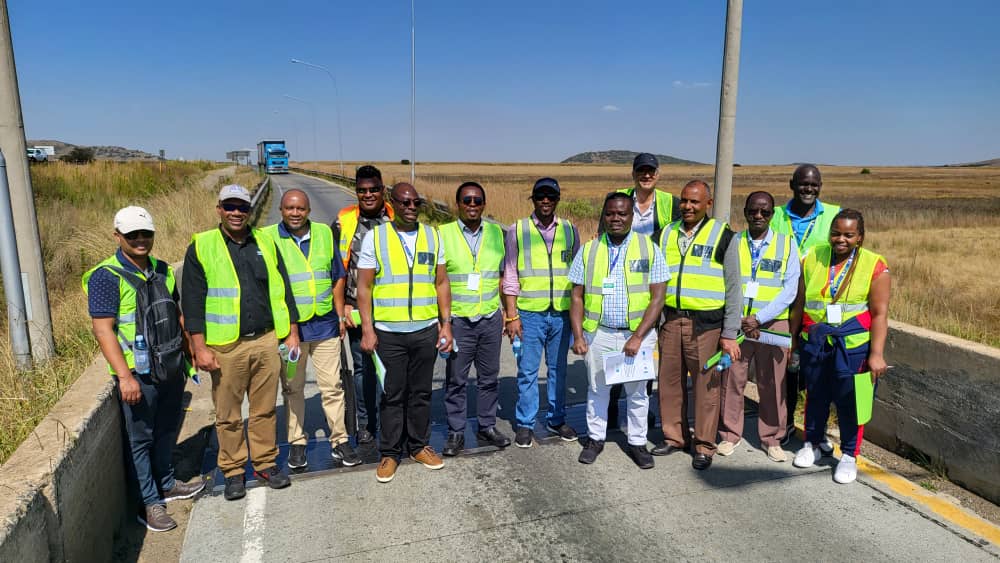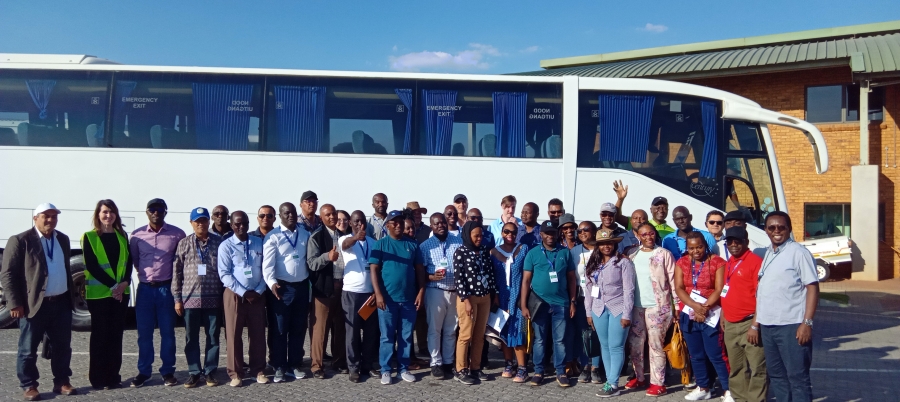
AU and Regional Economic Communities meet to discuss Harmonisation of Road Transport Regulatory Frameworks in Africa
East African Community Headquarters, Arusha, Tanzania, 21st April, 2023: A continental workshop on harmonisation of Africa road transport regulatory frameworks organised by the African Union Commission (AUC) in partnership with the European Union (EU) funded Tripartite Transport and Transit Facilitation Programme (TTTFP) underway in Johannesburg, South Africa.
The four-day workshop from 18th to 21st April ,2023 organised to assess progress on the harmonisation and implementation of Vehicle Load Management (VLM) in Africa, exchanging best practices on policies and standards while soliciting realistic proposals for a continental VLM strategy.
Addressing the workshop during the opening session on behalf of AUC Director of Infrastructure and Energy, Dr. Kamugisha Kazaura, Acting Head of Transport and Mobility Division Mr. Eric Ntagengerwa emphasized the importance of harmonising road transport regulatory instruments in order to realize regional integration and aid trade facilitation by laying the groundwork for the effective implementation of the African Continental Free Trade Area (AfCFTA).

"Road transport facilitates roughly 80% of trade on the continent, and demand is expected to rise significantly in the coming years, aided by AfCFTA, which is why we need to increase the efficiency and capacity of transportation infrastructure and services for the movement of goods and people within and beyond borders.”
Mr Ntagengerwa said harmonisation of road transport will stimulate African economies by allowing African enterprises to expand and enter new markets, increase productivity, generate jobs, accelerate industrialisation, and contribute to the achievement of Agenda 2063 aspirations, goals, and objectives.
He praised the efforts made in the Tripartite region, which covers 800 million people, to harmonise transit and transportation instruments, adding, "This is an opportune time to scale up the best practices at the continental level to address trading barriers and realise a liberalised road transport market in Africa. The AUC is ready to provide Member States and Regional Economic Communities (RECs) with the required leadership and support."
On his part, Mr Bernard Dzawanda on behalf of COMESA Director of Infrastructure & Logistics Mr. Baptiste Mutabazi said “the three RECS are working toward the broader goal of accelerating continental economic integration, boosting economic growth, reducing poverty, and achieving sustainable economic development."
Ms Petra Pereyra, EU Ambassador to Botswana and SADC, discussed the EU's experience in integrating transport systems across the EU region. "To enable this level of intra-European mobility, we had to work tirelessly for decades to remove regulatory impediments to transport and trade in the EU. And this is the type of hard work that the TTTFP has been conducting for the past five years in collaboration with 25 SADC, EAC, and COMESA member states."

On the first day, the workshop focused on the causes and effects of vehicle overloading across the continent, emerging technologies and innovations, and continental initiatives on road transport and transit facilitation, as well as lessons learned from these programs to unlock the potential of AfCFTA, which is dependent on factors such as the removal of Non-Tariff Barriers to Trade (NTBs).
The foundations for the discussions are the recently adopted Tripartite Vehicle Load Management Agreement (VLMA), Multilateral Cross Border Road Transport Agreement (MCBRTA), and Model Laws and Regulations by the Tripartite Council of Ministers of the Common Market for Eastern and Southern Africa (COMESA), East African Community (EAC), and Southern African Development Community (SADC).
A study excursion to the Heidelberg Traffic Control Centre on the Johannesburg-Durban highway, the busiest section of the North-South Corridor, is also part of the workshop's experience-sharing initiatives, facilitated by the South African National Road Agency (SANRAL).
More than 150 policymakers, regulators, engineers, and experts from African Union Member States, Regional Economic Communities (RECs), AUC, AfCFTA Secretariat, African Union Development Agency (AUDA-NEPAD), Corridor Management Institutions, and international partners are attending the workshop.
Notes to the Editor
About Tripartite Transport and Transit Facilitation Programme (TTTFP)
TTTFP is an EU-funded Programme with a value of 18.6 million whose key result areas include the development of adoption of vehicle load management strategy, adoption of a framework to harmonize driver, vehicle and operator standards, implementation of ICT-based road transport systems to improve regulation and law enforcement and improvement of corridor efficiency based on SMART corridors concept.
The MCBRTA, VLMA and Model Laws were adopted by the Tripartite Ministers of Infrastructure in 2019 and Tripartite Ministers of Legal Affairs in 2020. The MCBRTA, VLMA and Model Laws were alsoadopted by the Tripartite Council of Ministers on 29 March 2023 and are now ready for signature by the Heads of State. 16 Member States of COMESA, EAC and SADC are at different stages of implementing the harmonised laws, regulations, systems, and standards of the Tripartite Multilateral Agreements on Vehicle Load Management and Cross Border Road Transport.
The Corridor Trip Monitoring System (CTMS), a trade transport tool designed to facilitate paperless monitoring and surveillance of trucks and cargo and will upon full development interface with customs, immigration, and public health systems to enhance seamless trade and transport, has been deployed in six corridors traversing Botswana, Namibia, Zambia and Zimbabwe and work is ongoing to deploy in other regional corridors.
The Transport Registers and Information Platform System (TRIPS), a switch that facilitates the secure sharing of driver, vehicle, operator and load information between Member States was launched in Namibia as the first of two hosting sites and Kenya will host the second TRIPS/CTMS site.
For more information, please contact:
Simon Peter Owaka
Senior Public Relations Officer
Corporate Communications and Public Affairs Department
EAC Secretariat
Arusha, Tanzania
Tel: +255 768 552087
Email: sowaka [at] eachq.org
About the East African Community Secretariat:
The East African Community (EAC) is a regional intergovernmental organisation of seven Partner States, comprising the Republic of Burundi, the Democratic Republic of Congo, the Republic of Kenya, the Republic of Rwanda, the Republic of South Sudan, the Republic of Uganda and the United Republic of Tanzania, with its headquarters in Arusha, Tanzania.
The EAC Secretariat is ISO 9001: 2015 Certified
